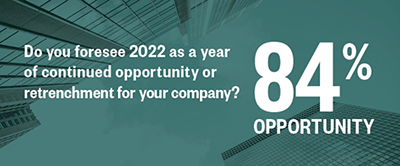
CRE Execs Optimistic Despite Growing Concerns

Commercial real estate executives remain optimistic despite growing worries about the near future, reported law firm Seyfarth Shaw LLP, Chicago.
“A vibrant 2021 for the commercial real estate industry combined with solid fundamentals going forward to support strong expectations for 2022,” said Paul Mattingly, Seyfarth Partner and Real Estate Department Chair. “Inflation, interest rates and the pandemic/endemic evolution are concerns, but do not overwhelm industry optimism.”
As the global economy continues to recover from the pandemic’s impact over the last two years, 2022 could mark a turning point for commercial real estate, Seyfarth said in its annual Real Estate Market Sentiment Survey. Executives need to navigate significant inflation, shifting workplace dynamics and an unstable supply chain, but nearly 85 percent of people surveyed said they consider 2022 a year of opportunity.
“These opportunistic feelings may be linked to the desire to accelerate deals before rate hikes hit the market,” the report said. “While the consensus follows the Fed guidance and respondents predict at least three hikes this year, industry executives are more uncertain about where the interest rate ceiling is and when the market starts to suffer.”
Other concerns for real estate executives this year correspond to the challenges impeding economic growth for every industry in 2022. Respondents flagged three economic hurdles as particular concerns: inflation, labor shortages and supply chain challenges. Delays in the Emergency Rental Assistance Program, formerly a hot topic in industry circles, ranked lowest among concerns cited in this year’s survey.
Last year, 46 percent of executives said they thought the Biden Administration would have a positive impact on the real estate industry. In November, the administration’s Infrastructure Investment and Jobs Act passed with bipartisan support and one-quarter of survey respondents said they will take advantage of the new legislation in the next five years. “Since infrastructure projects tend to move slowly, investment plans from a quarter of development decision-makers in the first year is significant,” Seyfarth said.
In what may be the biggest warning sign from the January survey, more than three-quarters of executives surveyed said the shift to work-from-home models has adversely impacted their company culture. Respondents said their bottom lines have remained healthy, but described a new workplace where employee loyalty and corporate identity have both dipped. “Next year’s sentiment will be an important indicator for the sector as many of these hybrid arrangements become industry standard,” the report said.
